- Skip to Main Menu
- Skip to Main Content
- Notable Equipment
- Record Labels
- Additional Artists
- Things I Like

The Allman Brothers Band

Discography
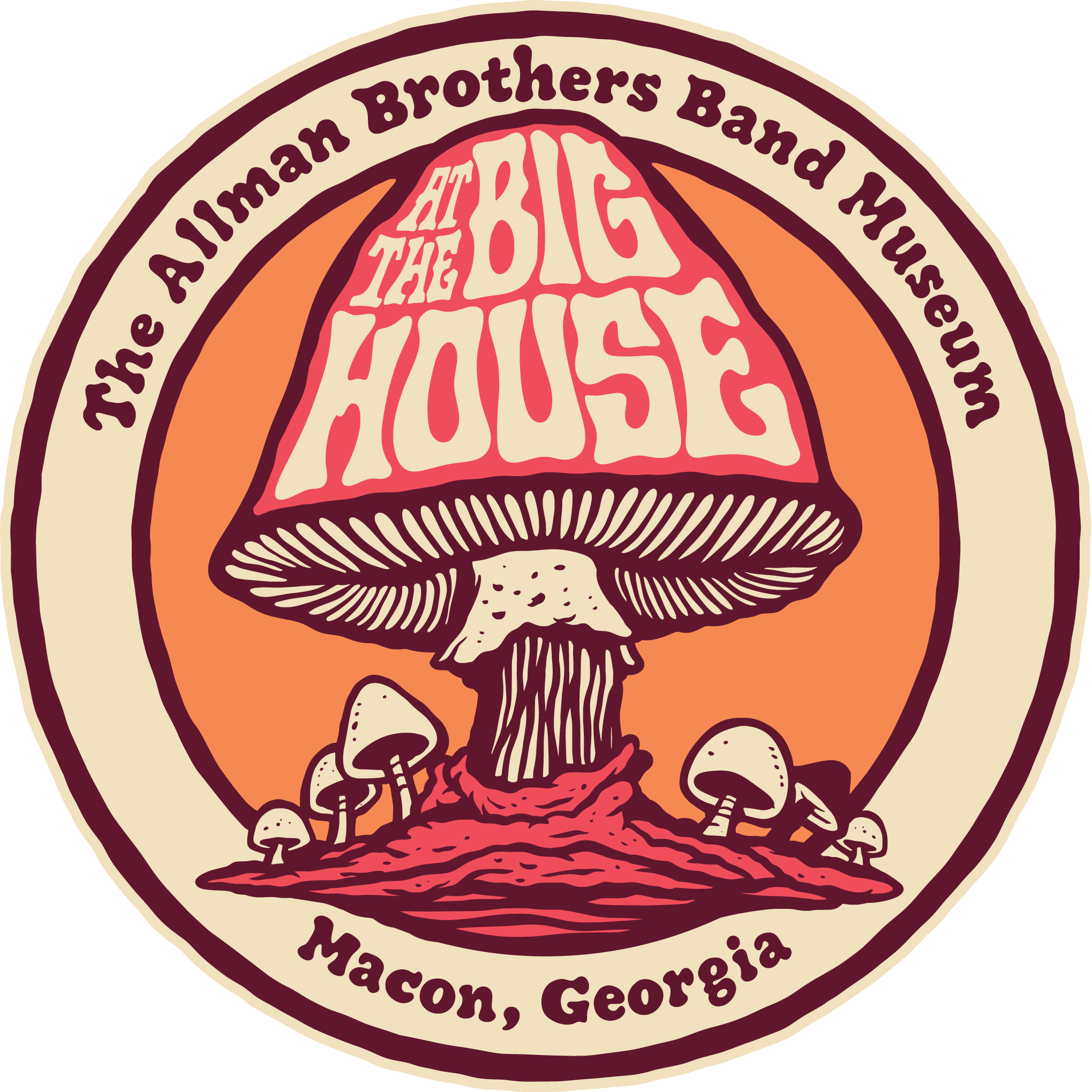
History Of The Band
2010-present.
In 1969 a revolution was launched from the streets of Macon, consisting of guitars, bass, keyboards, drums, and a uniquely spirited brotherhood. The revolutionaries of record were the Allman Brothers Band, who, as the founders of what became known as Southern rock, changed the course of popular American music and turned Macon into the recording hot bed of the 1970s.
From 1969 to 1979, the Allmans called Macon home, and their contributions and exploits have become a legendary part of this town’s history.
The band was formed in Jacksonville, Florida, in 1969 by brother Duane Allman (slide guitar and lead guitar) with Gregg Allman (vocals, organ, songwriting), Dickey Betts (lead guitar, vocals, songwriting), Berry Oakley (bass guitar), Butch Trucks (drums), and Jaimoe (drums). While the band has been called the principal architects of Southern rock, they also incorporate elements of blues, jazz, and country music, and their live shows have jam band-style improvisation and instrumentals.
Duane & Gregg Allman had teen bands: The Houserockers, The Escorts, The Allman Joys & HourGlass. Jaimoe played with Lamar Williams in George Woods & the Sounds of Soul, Otis Redding, Percy Sledge, Joe Tex and other R&B greats. Butch had pre-ABB bands The Vikings, The 31st of February, and was classically trained, playing tympani in the Jacksonville Symphony Orchestra. Berry Oakley first played bass for Tommy Roe & The Roemans, then the Second Coming with Dickey Betts. Dickey Betts had pre-ABB bands The Jokers and The Second Coming with Berry Oakley. Duane Allman, after quitting the Hourglass due to lack of artistic freedom, heads to Fame Studios in Muscle Shoals, Alabama, in 1968, and becomes the South’s premier session guitarist.
In January 1969, Duane Allman signs a management contract and recording contract with Phil Walden and Capricorn Records, after Phil hears his incredible guitar solo on Wilson Pickett’s version of “Hey Jude”. Duane begins to assemble a band.
ABB gradually formed in Jacksonville, FL in February & March 1969, with their actual birthdate March 26, 1969, and they move to Macon, GA within weeks, in order to utilize Phil Walden’s resources there.
ABB’s first LP, self-titled, was released in November 1969, and was lauded by critics but had tepid sales.
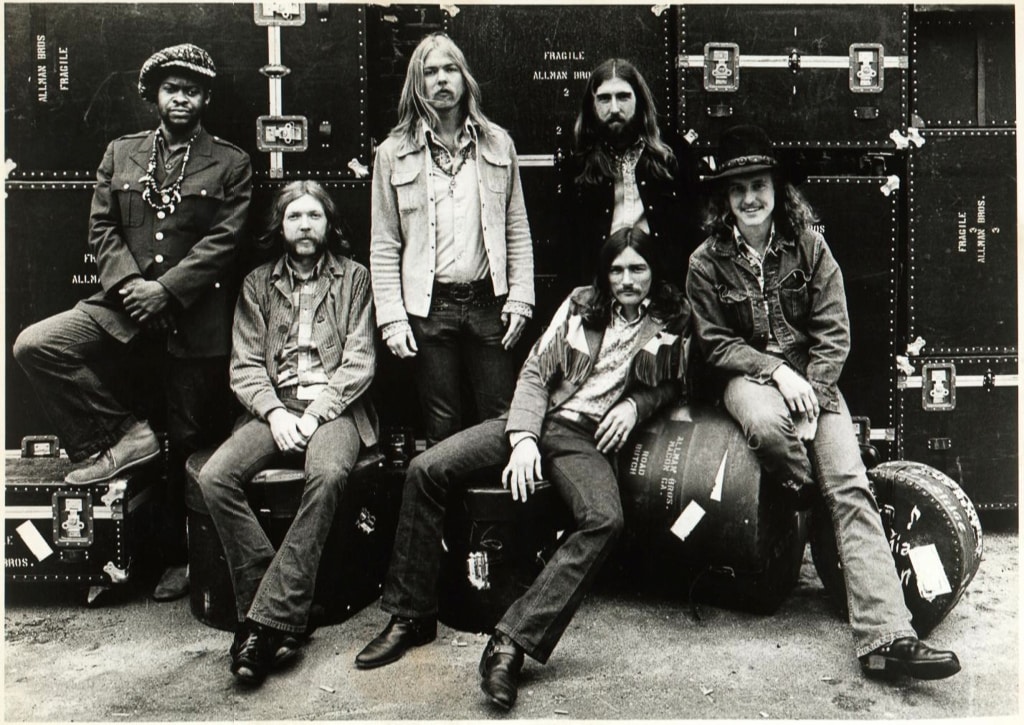
THE ORIGINAL BAND
Line-up #1 (March 1969 – October 1971) Duane Allman Jaimoe Berry Oakley Dickey Betts Butch Trucks Gregg Allman
The band achieved its artistic and commercial breakthrough in 1971 with the release of At Fillmore East, which is considered by most critics to be the best live album ever made. It ranks #49 on Rolling Stone’s list of the best albums of all time. During the most fruitful period of rock music history, the mid 60s through the early 70s, George Kimball of Rolling Stone magazine hailed them as “the best damn rock and roll band this country has produced in the past five years.”
Just four days after At Fillmore East was certified gold, group leader Duane Allman was killed in a motorcycle accident on 10/29/71. The group survived that tragedy, as well as the death of bassist Berry Oakley in another motorcycle accident a year later; the band achieved even greater commercial success in 1972 with the LP Eat a Peach reaching #4 on the charts.
In 1973, on the strength of radio hits and the fan base they had earned through incessant touring, they earned their first #1 album Brothers and Sisters, with Chuck Leavell on piano, and Lamar Williams on bass. Internal turmoil overtook the band soon after; the group dissolved in 1976.
ABB plays the Second Atlanta Pop Festival in Byron, GA to hundreds of thousands of people. They were the first band to play on July 3, 1970, and the last to play on July 5th, 1970.
ABB’s second LP, Idlewild South, was released in September 1970 with Tom Dowd producing. Although a step forward from the first LP, the sales were not much better.
Duane Allman invigorated Derek & the Dominos and recorded all but 3 songs with them for Layla and Other Assorted Love Songs album. The LP was released in December 1970.
The third ABB LP, At Fillmore East, was recorded in March 1971, released in July 1971, and was certified GOLD on October 25, 1971. ABB founder Duane Allman passes away four days later.
The ABB is hand-picked to be the final act to perform at the Fillmore East in NYC: June 27, 1971.
The band’s fourth LP features Duane on three studio tracks and bonus Fillmore East recordings, and the remaining five men finish the LP without Duane in December 1971. Eat A Peach outsells At Fillmore East in 1972, and the band tours as a five piece band.
In late 1972, the ABB asks pianist Chuck Leavell to join the band. They begin recording their fifth LP, Brothers and Sisters. Shortly after, Berry Oakley passes away, and is replaced by Jaimoe’s friend from Mississippi, Lamar Williams.
In 1973, Brothers and Sisters reaches #1 on the charts, and Ramblin Man reaches #2 on the singles chart, the highest ever for the ABB.
In July 1973, the ABB headlines the highest attended concert in history at Watkins Glen, NY: 600,000 people came to see the Grateful Dead and The Band as well.
In 1974, the band plays a handful of shows to huge crowds and Gregg & Dickey also have solo tours.
In 1975, the ABB releases their sixth LP, Win, Lose or Draw, which sells well; however, the response from critics is lukewarm. The band also plays benefit concerts for Georgia Governor Jimmy Carter’s Presidential campaign, thereby helping him get elected.
In May 1976, the ABB breaks up, and a double live LP called Wipe the Windows, Check the Oil, Dollar Gas is released, mostly comprised of the Chuck & Lamar line-up.
In 1976, Jaimoe founds a jazz fusion group with Chuck Leavell and Lamar Williams called Sea Level, and they also record for Capricorn Records.
In 1977-78, Gregg & Dickey do solo tours.
In 1979, the ABB reunites with Dan Toler on second guitar and Dave “Rook” Goldflies on bass. They record the ABB’s final Capricorn LP, Enlightened Rogues, which sells well and gets a decent response from critics and fans. The 1979 tour is a success as well.
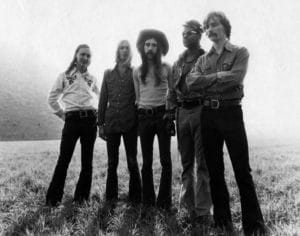
Line-up #2 (October 1971 – October 1972) Jaimoe Berry Oakley Dickey Betts Butch Trucks Gregg Allman
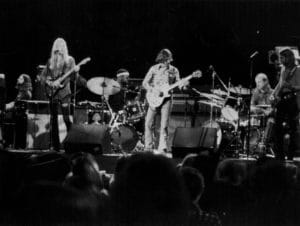
Line-up #3 ( October 1972 – November 1972) Jaimoe Berry Oakley Dickey Betts Butch Trucks Gregg Allman Chuck Leavell
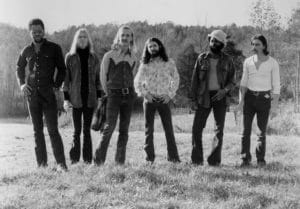
Line-up #4 (December 1972 – May 1976) Jaimoe Dickey Betts Butch Trucks Gregg Allman Chuck Leavell Lamar Williams
They reformed briefly at the end of the decade with additional personnel changes, and dissolved again in 1982.
In 1980 & 1981, the ABB records two LPs for Arista Records, to tepid reviews & response.
The ABB breaks up in January 1982.
Gregg & Dickey pursue solo projects, and Gregg has a hit with “I’m No Angel”.
The ABB reunites with Warren Haynes on guitar and Allen Woody on bass in 1989 for their 20th anniversary, and a box set named Dreams is released. They also play the Beacon Theatre in NYC for the first time that year.
Line-up #5 (February 1979 – November 1980) Jaimoe Dickey Betts Butch Trucks Gregg Allman Dan Toler David Goldflies
Line-up #6 (November 1980 – January 1982) Dickey Betts Butch Trucks Gregg Allman Dan Toler David Goldflies Mike Lawler Frankie Toler
Line-up #7 (June 1989- November 1990) Jaimoe Dickey Betts Butch Trucks Gregg Allman Warren Haynes Johnny Neel Allen Woody
In 1989, the group reformed with some new members and has been recording and touring since. This remarkable renaissance period has lasted 24 years, including a series of personnel changes in the late 1990s, and the departure of founding guitarist Dickey Betts in 2000.
In 1990, the band releases a very well received LP, Seven Turns, which eventually goes GOLD.
In 1991, the band releases the LP “Shades of Two Worlds” and it is very well-received.
In 1994, the band releases “Where it all Begins” and it is a hit, going GOLD. They also are featured at Woodstock ’94.
In 1995, the ABB is inducted into the Rock and Roll Hall of Fame.
In 1997, Warren Haynes and Allen Woody resign from the ABB to take their own band, Gov’t Mule, full-time. Jack Pearson (guitar) and Oteil Burbridge (bass) replace them.
In 1999, the band celebrates it’s 30th Anniversary, with virtuoso prodigy Derek Trucks joining the band after Jack Pearson resigns.
Line-up #8 (December 1990 – December 1991) Jaimoe Dickey Betts Butch Trucks Gregg Allman Warren Haynes Allen Woody
Line-up #9 (January 1992 – March 1997) Jaimoe Dickey Betts Butch Trucks Gregg Allman Warren Haynes Allen Woody Marc Quinones
Line-up #10 (April 1997 – March 1999) Jaimoe Dickey Betts Butch Trucks Gregg Allman Marc Quinones Jack Pearson Oteil Burbridge
Since 2001, the group’s lineup has remained unchanged, with guitarists Warren Haynes and Derek Trucks, bassist Oteil Burbridge, and percussionist Marc Quinones joining founding members Gregg Allman, Jaimoe and Butch Trucks. They also became renowned for their month-long string of shows at the Beacon Theatre in New York City every March. The band has been awarded eleven gold and five platinum albums between 1971 and 2005 and was inducted into the Rock and Roll Hall of Fame in 1995.
In 2000, the ABB and founding guitarist Dickey Betts part ways. Meanwhile, former ABB & then-current Gov’t Mule bass player Allen Woody passes away, opening the door for the return of Warren Haynes to the ABB.
In 2003, the current line-up releases “Hittin The Note” to much acclaim.
Line-up #11 (April 1999 – June 2000) Jaimoe Dickey Betts Butch Trucks Gregg Allman Marc Quinones Oteil Burbridge Derek Trucks
Line-up #12 (June 2000 – December 2000) Jaimoe Butch Trucks Gregg Allman Marc Quinones Oteil Burbridge Derek Trucks Jimmy Herring
Line-up #13 (March 2001 – 2014) Jaimoe Butch Trucks Gregg Allman Marc Quinones Oteil Burbridge Derek Trucks Warren Haynes
The group earned a Lifetime Achievement Grammy Award in 2012. Rolling Stone ranked them 52nd on their list of the 100 Greatest Artists of All Time, and the Allman Brothers Band is the only group in history to have four different guitarists on Rolling Stone’s 100 Greatest Guitarists of all time: Duane Allman, Dickey Betts, Warren Haynes and Derek Trucks.
In 2011, the ABB is awarded the Lifetime Achievement Award Grammy.
In 2012, the ABB receives the key to the Beacon Theatre in NYC for playing over 200 straight sold-out shows, mostly every March. Gregg Allman releases his autobiography, “My Cross To Bear,” and Derek Trucks and Warren Haynes play in an all-star blues band at a concert for President Obama, with the President even singing with them on “Sweet Home Chicago.”
- Most popular artists worldwide
- Trending artists worldwide
- Tourbox for artists
Search for events or artists
- Sign up Log in
- Get the app
- Moscow concerts
- Change location
- Popular Artists
- Live streams
- Deutsch Português
- Popular artists
Allman Brothers Band
- No longer touring
- 2051 past concerts
Join Songkick to track your favorite artists and never miss them live.
Tours most with
Past concerts.
Cutting Room
Beacon Theatre
View all past concerts
The Allman Brothers are a southern rock band that formed in Florida, U.S. in 1969. Their music is a fusion of blues, jazz, country, R&B, and rock and roll. Their efforts have won them eleven gold and five platinum albums.
Brothers Duane and Gregg Allman got their start in music in the early 1960’s, performing as the duo the Allman Joys. They moved to Los Angeles shortly after to record a few albums under the musical alias The Hour Glass for label Liberty Records. The brothers were inspired by British invasion band the Yardbirds and combined that rock n roll influence with blues and R&B. Duane Allman moved to Alabama for a short stint to work as a session guitarist for FAME studios and played for big names like Aretha Franklin. The Allman brothers were reunited in Florida and played around with the idea of forming their own band with two drummers and two guitarists. As fate would have it Phil Walden, who previously managed Otis Redding was looking for a rock band to sign under his new label Capricorn.
Duane and Gregg Allman joined friends, guitarist Dickey Betts, drummer Jaimoe Johanson, drummer Butch Trucks, and Berry Oakley and formed their band aptly named The Allman Brothers Band. They practiced and perfected their sound in Macon, Georgia and finally recorded their album in NYC in an impressive two weeks. Their debut album “The Allman Brothers Band” was released in November 1969. Their sophomore album “Idlewild South” was released the following year in 1970 with popular singles “Midnight Rider” and “In Memory of Elizabeth Reed.” Both albums had minor commercial success, but they had more luck with their next release.
The Allman Brothers Band fame exploded with their live-recorded album in 1971 that featured a concert they played in New York called “At Fillmore East.” The album charted at No.13 on the Billboard Top Pop Albums and the Allman Brothers Band became known as one of the great rock n roll bands of the time. Unfortunately, Duane Allman was killed in a motorcycle accident three months after the release of the album and a year later bassist Oakley was also fatally killed in a similar accident. With heavy hearts, the Allman brothers band bounced back quickly and released the album “Eat A Peach” released in 1972 that contained some of Duane’s last studio recordings. “Brothers and Sisters” was released in 1973 and peaked at No. 1 on the charts.
The Allman Brothers Band was inducted into the Rock N Roll Hall of Fame in 1995. Along with bands like the Grateful Dead and Cream, they took rock and roll to a new level with their instrumental solos and improvisations.
Live reviews
The Allman Brothers band from Florida, formed back in 1969. It started with just the 2 brothers, Duane Allman and Gregg Allman and grew from there. The band mostly use a southern rock style to their music, but they also incorporate bits of jazz, blues and country music into their mix. The group actually did have a short split in 1976 and got back together, but they ended up breaking up again in 1982. The band once again decided to give it another shot when they reformed once again in 1989, coming back with new albums and doing a lot of touring to get back on track. The band was ranked 52nd as well on the Rolling Stone's list of the 100 Greatest Artists of All Time in 2004, I think to even be on their list would be pretty amazing for any band. In January of 2014 however, after all their success, Derek Trucks from the band said that himself and Warren Haynes were going to leave the group at the end of the year, later in the year the band admitted they would stop touring after the other members had left. I'm sure their fans will be sad to see them go, but they've broken up and reformed so many times that part of me feels like it's not really the end. The group, although a little outdated in their performances for my taste, know how to whip up some amazing guitar riffs and leave the audience wanting more when they're on stage. I like their song lyrics and the talent that they display, but their live performances are pretty basic, but for some people that maybe ideal.
Report as inappropriate
The Allman Brothers Band is one of the better shows to see live. They always deliver a good performance, considering that they have been doing this for over 40 years now!
They have a nice mix of blues, folk, rock and other similar styles. They are able to blend these sounds into a unique mix of music that promotes a good experience and allows their listeners to get into a good mood and just be free. I always have an awesome experience at their shows and they always give a good performance.
The Allman Brothers Band are a throwback to a past age where the artists put everything they have into their music. You will never leave one of their shows feeling unfulfilled and are sure to have an awesome experience. These guys have a very entertaining way to play their instruments and really get into it.
Their sets are really put together in a good way that makes sure they are able to play all of their hits from the past and they even do some remix type versions of other classics from their genre. The lighting at their shows is always really promoting to good visuals and just overall awesome vibes.

Posters (6)
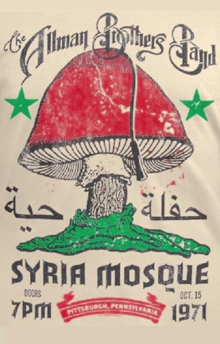
Touring history:
Last event:
Popularity ranking:
- Morat (1376)
- Allman Brothers ... (1377)
- Buffalo Springfield (1378)
Concerts played in 2024:
Most played:
- New York (NYC) (403)
- Atlanta (90)
- Los Angeles (LA) (62)
- Philadelphia (62)
- Springfield (62)
Appears most with:
- Blues Traveler (44)
- Widespread Panic (29)
- Karl Denson's Tiny Universe (27)
- Little Feat (26)
- Bob Weir & RatDog (21)
Distance travelled:
- Most popular charts
- Campaigns for promoters
- API information
- Brand guidelines
- Community guidelines
- Terms of use
- Privacy policy
- Cookies settings
- Cookies policy
Get your tour dates seen everywhere.
- But we really hope you love us.
Join our newsletter!
The Grateful Dead Drew A Crowd Of Over 125,000 Fans To Englishtown, NJ, On This Day In 1977 [Audio]

On September 3rd, 1977, the Grateful Dead returned to the stage at Englishtown, NJ’s Raceway Park for the band’s first show in three months after a car accident left drummer Mickey Hart temporarily unable to play. The group was welcomed back by a record-breaking crowd numbering at least 125,000 fans, with some sources claiming as many as 175,000 were in attendance.
Originally billed as the Summer’s End Concert but known to posterity simply as “The Englishtown Show”, the historic concert featured sets by Marshall Tucker Band and New Riders of the Purple Sage and nearly didn’t happen at all due to a a state law that required a permit for any concert lasting over 18 hours and yielding over 3,000 people. Luckily, authorities allowed the show to go on, but only after they were assured that the Hells Angels would not be providing security for the Dead.
With limited parking at the venue, locals offered to let fans park on their properties, while some left their vehicles miles from the venue and walked the rest of way. Like Woodstock , which brought scores of surprisingly polite young hippies to an unsuspecting small town, The Englishtown Show wound up impressing locals like John Westlake , who worked concessions at the concert. Fans purchased an estimated 200,000 cans of soda and 15,000 pounds of hotdogs, “But they were great, stood in line, waited patiently, and no one tried to start an argument,” Westlake said.
Musical highlights of the performance included the first “Truckin'” in over two years, and the first “Terrapin Station” since the release of the of the same name. “And now ladies and gentlemen, we’d like to play a little ditty from our newest album, at your record stores currently,” Phil Lesh said introducing the tune. There were many non-musical highlights as well, including when a woman went into labor shortly after Marshall Tucker Band’s opening set. She was evacuated by helicopter and gave birth to a heady, I mean healthy baby boy.
The Englishtown Show was released on Dick’s Picks Vol. 15 in 1999. Listen via Spotify here or check out the full recording below, courtesy of the DeadLists Project.
Grateful Dead – Raceway Park – Englishtown, NJ – 9/3/77
[Audio: Matthew Vernon via DeadLists Project]
- Statistics Stats
- You are here:
- Allman Brothers Band, The
- August 31, 1975 Setlist
The Allman Brothers Band Setlist at Louisiana Superdome, New Orleans, LA, USA
- Edit setlist songs
- Edit venue & date
- Edit set times
- Add to festival
- Report setlist
- Ramblin' Man Play Video
Edits and Comments
4 activities (last edit by Cholly1 , 7 May 2022, 15:10 Etc/UTC )
Songs on Albums
- Ramblin' Man
Complete Album stats
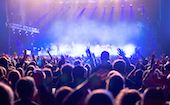
The Allman Brothers Band
More from this artist.
- More Setlists
- Artist Statistics
- Add setlist
Louisiana Superdome
- The Allman Brothers Band This Setlist Add time Add time
- Wet Willie Add time Add time
- The Charlie Daniels Band Add time Add time
- The Marshall Tucker Band Add time Add time
The Allman Brothers Band Gig Timeline
- Aug 24 1974 Ladd Memorial Stadium Mobile, AL, USA Add time Add time
- Aug 27 1975 Schaefer Stadium Foxborough, MA, USA Add time Add time
- Aug 31 1975 Louisiana Superdome This Setlist New Orleans, LA, USA Add time Add time
- Sep 04 1975 Kiel Auditorium St. Louis, MO, USA Add time Add time
- Sep 09 1975 Riverfront Coliseum Cincinnati, OH, USA Add time Add time
3 people were there
Share or embed this setlist.
Use this setlist for your event review and get all updates automatically!
<div style="text-align: center;" class="setlistImage"><a href="https://www.setlist.fm/setlist/the-allman-brothers-band/1975/louisiana-superdome-new-orleans-la-43ddbb7b.html" title="The Allman Brothers Band Setlist Louisiana Superdome, New Orleans, LA, USA 1975" target="_blank"><img src="https://www.setlist.fm/widgets/setlist-image-v1?id=43ddbb7b" alt="The Allman Brothers Band Setlist Louisiana Superdome, New Orleans, LA, USA 1975" style="border: 0;" /></a> <div><a href="https://www.setlist.fm/edit?setlist=43ddbb7b&step=song">Edit this setlist</a> | <a href="https://www.setlist.fm/setlists/the-allman-brothers-band-1bd6ad7c.html">More The Allman Brothers Band setlists</a></div></div>
Last.fm Event Review
[url=https://www.setlist.fm/setlist/the-allman-brothers-band/1975/louisiana-superdome-new-orleans-la-43ddbb7b.html][img]https://www.setlist.fm/widgets/setlist-image-v1?id=43ddbb7b[/img][/url] [url=https://www.setlist.fm/edit?setlist=43ddbb7b&step=song]Edit this setlist[/url] | [url=https://www.setlist.fm/setlists/the-allman-brothers-band-1bd6ad7c.html]More The Allman Brothers Band setlists[/url]

Tour Update
Marquee memories: winona fighter.
- Winona Fighter
- May 24, 2024
- May 23, 2024
- May 22, 2024
- May 21, 2024
- May 20, 2024
- May 19, 2024
- FAQ | Help | About
- Terms of Service
- Ad Choices | Privacy Policy
- Feature requests
- Songtexte.com

1973: The Grateful Dead and the Allman Brothers Mega-Concert
- Share by Facebook
- Share by Email
In the summer of 1973, long before bumper stickers of the iconic skeleton-and-roses logo were a familiar sight on camper vans, the Dead teamed up with another legendary rock band, the Allman Brothers, to play a pair of concerts at RFK Stadium that were the first multi-day rock extravaganza in the District's history that drew 80,000 people to witness a rare pairing of southern blues-rock and San Francisco psychedelia. As Rolling Stone reviewer Gordon Fletcher noted: "Every rock & roller on the East Coast worth his or her faded jeans...showed up." It was a show that paved the way for scores of other big stadium concerts and events such as the HFStivals of the 1990s and early 2000s.
Given their strikingly different styles, it might seem the Dead and the Allman Brothers were an unlikely combination. But the two groups had a connection that went back to 1969, when Garcia met guitarist Duane Allman after a Dead concert in Atlanta and jammed with him and other musicians. As Dead bassist Phil Lesh recalled in a memoir , when the Allmans opened for the Dead at the Fillmore East in New York City in February 1970, Garcia recommended that he catch the Allmans' set. "They're kinda like us — two drummers, two guitars, bass and organ, and I hear they jam hard," Garcia told him. Members of the two bands developed a friendship, which continued even after Duane Allman's death in a 1971 motorcycle accident, and over the next few years sometimes showed up to jam at each others' concerts. "We always loved playing with the Allman Brothers," the Dead's rhythm guitarist Bob Weir once explained.
The two bands' managements laid plans in 1972 for them to do a tour together, and even scheduled concerts for the following spring in Athens, GA and Houston. But those were canceled after yet another Allmans member, bassist Berry Oakley, was killed in a motorcycle crash. After the grieving subsided, according to rock historian Alan Paul's book on the Allman Brothers, it was decided that the bands would play a scaled-down tour — a pair of concerts in Washington and another at the Watkins Glen racetrack in New York in the summer of 1973.
Both bands had developed increasingly large followings, and response to the mega concert was enthusiastic. Ticketron, an early computerized ticket vendor, reported at the time that some of the 80,000 fans who purchased tickets came from as far away as Montreal. (The price: Just $7 for each day's show.)
When the horde descended upon Washington, pandemonium ensued. District police made a decision to allow concert-goers to hang out all night in the open area surrounding RFK Stadium — "If 2,000 kids show up and sit on the grass all night, there's not a hell of a lot you can do about it," Lt. Albert Yowell explained to The Washington Post. The bands' fans took him up on that, partying until late and then sleeping in their cars outside the stadium so that they could get to the front of the line. They left mounds of trash and beer bottles in their wake.
According to a lengthy account of the concert by Washington Post reporters Lawrence Feinberg and Tom Zito, things soon got even more chaotic. On the morning of Saturday, June 9, the turnstiles were scheduled to open at noon. But 45 minutes before that, a restless mob of 2,000 tore down a gate, and about half of them forced their way into the stadium before District police were able to blockade the entrance. At that point, stadium officials decided to open all of the gates, and thousands more rushed in to grab seats, which weren't reserved.
With the multitude quickly in place, the party from the night before resumed, as Texas rocker Doug Sahm opened the show. The police had been so overwhelmed by the size of the crowd that they didn't stop them from bringing in coolers full of wine and bottles of liquor. The Post reported that drug dealers roamed through the crowd, selling marijuana and Quaaludes as if they were bags of peanuts. (Because of the latter, "many of the passageways to the grandstands contained youths who were sprawled out on the concrete with their eyes closed," Feinberg and Zito wrote.) One male reveler discarded his clothes and roamed through the stands in the nude. Though he and 17 others were arrested for disorderly conduct, for the most part, "the crowd was peacable," the reporters noted. Those in the first-day crowd of 53,000 who weren't stoned on downers spent much of the time dancing, despite the 90-degree heat.
The bacchanalia grew so frenzied that when Larry Magid, the concert's promoter, climbed atop a brace holding the stage wall in place to survey the crowd around noon, even he was dismayed. "This is no fun!" he told a Post reporter.
Things were equally crazy for the performers. According to Paul's book on the Allman Brothers, the pressure that came with the band's growing fame and success was taking its toll on the musicians. But in Washington, the stress came to a head. The Dead's roadies — who were, as Weir noted, "evangelical about LSD and had no compunction about dosing people" —were slipping it into the food and drinks backstage. The Allman Brothers musicians themselves had been warned beforehand, and kept their hands on their beer cans to cover them, but the band's crew didn't get the word, and some undoubtedly spent the afternoon struggling to work in a hallucinatory haze. Allmans roadie Kim Payne recalled opening a case of cables and freaking out — "they were all moving and looked like snakes," as he later told Paul. At one point, a brawl even broke out between some of the crew and record company executives.
The Dead played first, opening with "Promised Land," and playing songs that included "Deal," "Looks Like Rain," "Jack Straw," "China Cat Sunflower," "He's Gone," "Truckin," and "Sugar Magnolia." (From Dead.net, a fan site, here's the complete set list .) After they finished, the crowd had to wait for four hours before the Allman Brothers took the stage. Bob Weir and Ronnie Montrose, a guitarist who had played with Van Morrison in addition to his own eponymous group, joined the Allmans for "Mountain Jam." (As the Grateful Dead Guide notes, the song was an intriguing connection between the bands; it was based upon a tune by British folk-rocker Donovan, "There is a Mountain," which had also served as an inspiration for the Dead's second studio LP, 1968's Anthem of the Sun .)
As the Post reported, the Allmans — despite the backstage turmoil — "clearly stole the show, with high-power boogie music that had the audience undulating throughout the night."
After the music ended at around midnight, many of the concertgoers lingered around RFK and continued their reveries for a couple of hours, tossing Frisbees and blasting music on tape players and radios, in what the Post likened to "a jamboree of freaks." Eventually, many crawled into their cars to sleep, while others simply bedded down in the parking lot gutters and on the grassy slopes around the stadium. A few even pitched tents, despite the police's intention not to allow that.
The Sunday concert attracted a smaller crowd of about 30,000, who packed the infield, making it "as uncomfortable as a New York subway car during rush hour," according to a Post account by Zito and Megan Rosenfeld. The dancing throng was joined by saffron-robed members of the International Society for Krishna Consciousness, who handed out incense sticks and tried preaching to the intoxicated. At one point in the show, fans scaled two iron scaffoldings in the infield — hanging from them, according to the Post, "like denim monkeys," until police made them get down. The Dead, who this time headlined the show, started out with "Morning Dew" and gave an ultramarathon performance, playing for six hours before concluding with a cover of Chuck Berry's "Johnny B. Goode." (Here's the complete set list. ) They got a negative review from Rolling Stone critic Fletcher, who complained that "though they frequently displayed commendable instrumental virtuosity, they suffered from a relative paucity of musical ideas." Even so, he admitted, the hard-core fans who didn't wander off seemed to be enthralled, especially during "Truckin."
Here's a curious relic of the Sunday concert — some silent footage, shot with a Super 8 home movie camera by WFMU DJ Bud Styple.
About the Author
You might also like.
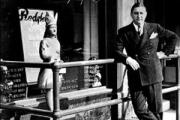
"The Whitest Huddle of Any Team in the League"
“We’ll start signing Negroes when the Harlem Globetrotters start signing whites” - Redskins policy in 1961, as the only all-white NFL team.
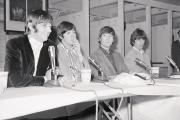
The Beatles' Final D.C. Concert
Although their first concert in Washington D.C. in 1964 was certainly more historic, the Beatles' last visit in 1966 was downright bizarre.
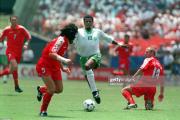
1994: World Cup at RFK Stadium Produced One of Soccer's Greatest Goals
One of the most thrilling goals in World Cup history was scored at RFK Stadium in Washington in 1994.
The devastating, tragic story of The Allman Brothers Band
Just as everything seemed to be going right for The Allman Brothers, drugs, deaths and disintegration shot their dream into oblivion
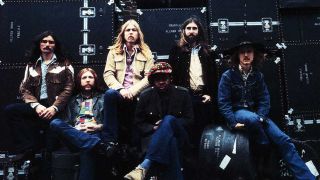
It's all going very wrong circling over New York, the diverted and delayed Virgin Atlantic 747 that I’m on board is shuddering its way through a thunderstorm and getting ready for a second attempt at landing. Meanwhile, somewhere down below, the Allman Brothers are already on stage – and I’m supposed to be there.
Nearly two hours later at the hotel, it scarcely seems worth phoning to apologise. But their manager is cheerfully insistent: “They’ll be on a while yet. Come on over.”
One cab ride later I’m being ushered through the stage door straight into the auditorium as the band walk on stage for the encores. I’m just taking in the faded grandeur of the ornate Beacon Theatre and breathing in the aroma of a hot, happy crowd when, breaking out of a series of chords and low-key guitar flurries, comes the unmistakable opening riff of Layla .
The crowd vibrates with pleasure – that is, those who aren’t crouched protectively over sophisticated recording equipment or clutching 10-foot poles with twin microphones perched on top; there must be a dozen of them dotted around the stalls.
The Allman Brothers are ripping through Layla with a fluid poise, visibly alert to the song’s shifting patterns. On the left-hand side of the stage the diminutive figure of Gregg Allman sits sandwiched between his Hammond organ and the Leslie cabinet behind his head. He leans into the microphone, with his blond hair swaying around his shoulders. His plaintive, rasping voice still has that compelling edge, unaffected by the ravages of time – and there have been a few ravages.
Up at the back of the stage are two other original Allman Brothers: drummers Butch Trucks and Jaimoe, drawing on 35 years’ worth of rhythmic telepathy. As if that isn’t enough there’s another percussionist, Marc Quinones – a mere dozen years in the band – adding congas to the rolling beat centre stage.
Guitarist Warren Haynes , who first joined The Allmans 14 years ago, seems to act as the band’s musical fulcrum, while to his right bass player Oteil Burbage surfs the big beat wave. And tucked in by the percussionists is a tall, thin boy with long blond hair in a pony tail, absorbed in his guitar, emitting the same ‘crying bird’ tone that jousted with Eric Clapton on the original Layla , recorded by the latter in 1970.
Classic Rock Newsletter
Sign up below to get the latest from Classic Rock, plus exclusive special offers, direct to your inbox!
Back then it was another lanky, longhaired boy, Duane Allman ; tonight it’s Butch Trucks’s 23-year-old nephew Derek Trucks. To my 6am brain, stewing on sensory overload, it’s positively spooky.
“That’s only the second time we’ve played it, and it was the best of the two,” Gregg reveals the following afternoon in his hotel suite. “It was Butch’s idea – and a damn good one, I must say. He doesn’t have many, but he certainly came through with that one,” he laughs with his gentle Southern drawl, a hint of the charm that has proved irresistible over the years.
Butch and Gregg were among those present on the September day in 1970 at Miami’s Criteria studio when Duane suggested speeding up the doleful riff that Clapton had been playing around with, and then came up with the magic seven-note riff.
“I think most of us were there,” Gregg says, settling back on the sofa. “People were coming and going… It was three decades ago and… I don’t know.”
But you don’t forget a riff like that in a hurry.
“No, you really don’t.” He leans forward and rattles the ice in his glass of Coke. “There’s a couple of moments that I remember. It was about the time that Mr Clapton switched over from an SG to a Fender. He strapped that thing on and my brother strapped on a Gibson – of course. And then… whew!"
“But I still reckon he [Clapton] sounds better playing that fat Gibson – all that stuff he did with John Mayall and Cream . It was just that fluid thing, man: the SG, those little humbuckers and what have you. It was just so good for him.”
When Clapton hooked up with Duane Allman for the momentous sessions that produced the Layla album , the Allman Brothers were busy becoming the hottest live band in America. Duane and brother Gregg, a year younger, had been raised in Nashville by their mother – in an ominous foretaste of the future, their father was killed by a hitch-hiker robbing their house.
Ironically it was Gregg who first picked up a guitar; Duane was more interested in motorbikes to begin with. But by the time Gregg was converted at a BB King concert, when he first came across a Hammond B3 organ, Duane already had less grease and more string-callouses on the fingers of his left hand.
The Allman family had moved down to Daytona Beach, Florida, and the brothers played in local bands until they finished school in ’65. They then formed The Allman Joys and toured the local circuit, playing R&B influenced by British beat groups like The Yardbirds , The Spencer Davis Group and, of course, Cream. They then had a brief, disastrous brush with the hip, groovy Los Angeles music business as The Hour Glass, dressed in off-the-peg psychedelic outfits and trapped inside the record company’s gilded cage when all they wanted to do was play gigs.
The only good thing about that bad trip came while Duane was laid up with a virulent bout of flu. He spent two solid weeks developing an awesome slide guitar technique using the glass Coriciden medicine bottle. From then on he could scarcely be parted from his guitar or his bottle of Coriciden. Or, as Duane told the legendary John Hammond (the man who signed Aretha Franklin, Bob Dylan and Bruce Springsteen ) when he asked him how he got so good: “Man, I took speed every night for three years and practised.”
While Gregg stayed on the West Coast, contractually bound to a solo album, in 1968 Duane headed back to Florida and hooked up again with local bands, including the similarly Cream-obsessed Second Coming, who already had their own shit-hot guitarist Dickey Betts and top-drawer bass player Berry Oakley.
Duane also got a break when he was hired for a Wilson Pickett session on the strength of his playing on the Hour Glass albums. He suggested Picket cover The Beatles’ Hey Jude , taught the band the arrangements, and laid a sublime solo over the top.
The single sold a million, and Duane was suddenly in demand as a session player. But he was itching to form a band. And it was the late Otis Redding ’s manager, Phil Walden, who gave him the opportunity, telling him to form a trio and come to Macon, Georgia, to record for his newly formed Capricorn label.
Duane was so excited he turned up with a six-piece band, having recruited Betts and Oakley from The Second Coming, a couple of session drummers he’d played with – Jai ‘Jaimoe’ Johanson and Butch Trucks – and summoned Gregg back from La La land.
Even now Gregg chuckles at the thought of being the last to join The Allman Brothers:
“I remember walking into this room, and there were two sets of drums set up and Duane is thrusting a lyric sheet for Muddy Waters ’ Trouble No More in my hand saying: ‘Now, there’s two extra beats at the end of each measure.’ I’d just got out of the car from driving across the country, and I wasn’t ready for this. I said: ‘I don’t think I can do this.’ And he started going: ‘You little punk!’ at me in front of all these guys I didn’t even know. So I snatched the lyrics out of his hand and said: ‘Kick this motherfucker off’.”
So now there was a healthy dollop of sibling rivalry to add to the heady musical brew the band were working up in their cramped two-room apartment in Macon. They’d head down the street to a cemetery, where they’d strum away beside a gravestone marked ‘In memory of Elizabeth Reed’, fuelled by a combination of wine, weed and the magic mushrooms that were to become the band’s logo.
As an initiation into the brotherhood, each band member got a mushroom tattooed on his leg – certainly more romantic than getting crabs together on tour in Texas a few months later.

Their First Album, The Allman Brothers Band , in 1969, laid the foundation for a whole new style of rock music. It blended a bluesy, jazz-tinged soul with a progressive Southern vibe (as opposed to the reactionary redneck vibe that afflicted so many of their inferior imitators), characterised by Gregg’s gruff, heartfelt vocals, the dual guitar lines that varied from gentle cooing to frenzied wrestling, and the remorseless percussive pulse.
They got in touch with their psychedelic side on the languid, sumptuous Dreams before the final, five-minute, pile-driving Whipping Post . Having made the album they wanted, the Allman Brothers embarked on a marathon tour to promote it.
Over the next two years they played an astonishing 500 gigs and effectively lived on the road, pausing only to hook up with Eric Clapton for his Derek & The Dominos album Layla and to record their second album, Idlewild South .
The Allmans’ second album was even better than the first, thanks to producer Tom Dowd who caught the essence of their road-hardened energy. Dickey Betts also came through with a couple of gems: the opening, stirring Revival and the towering instrumental In Memory Of Elizabeth Reed (their graveyard fave), which quickly assumed more than double its seven-minute length on stage.
And on stage was where the Allmans shone nightly for two to three hours, a spell-binding show that launched into a different trajectory every night, depending on the chemistry between them and the chemicals inside them.
“Enlightened rogues” was Duane’s description of the band and road crew, and they lived the life of rock’n’roll outlaws to the hilt – existing on a diet of speed to numb the boredom and exhaustion of travelling, and then varying the mood with a concoction of pharmaceuticals ranging from psychedelics to opiates.
But it was a high-risk strategy. First to snap was Twiggs, the road manager, who pulled a knife on a club owner in Buffalo who was refusing to pay them after a gig. In the ensuing fight the owner was stabbed and died. Twiggs was charged with first-degree murder.
Another roadie was shot in the thigh by an off-duty police officer in Macon for ‘resisting arrest after refusing a speeding ticket’. The band were also a drug bust waiting to happen. After a close call in New York when they tossed a package containing heroin out of a car window just as they were being pulled over by a cop (it was still there went they went back for it), their luck ran out in Alabama in March 1971 when police found marijuana, PCP and heroin in their van.
All six band members and three roadies were facing prison sentences, until some plea-bargaining got them off. More bizarrely, Twiggs was found not guilty of his murder charge by reason of insanity, after a methadone-induced performance in the witness box by bassist Berry Oakley, complete with nausea attacks. It enabled the defence to prove that any reasonable person would have been driven mad working for the Allman Brothers. Six months in a mental health facility later, Twiggs was able to resume his former employment.
But the music just kept getting better. And the album The Allman Brothers recorded just before their Alabama bust, Live At The Fillmore East , remains a strong contender for The Greatest Live Album Ever Made.
Taken from four lengthy sets, the band are in mesmerising form, tearing through standards like Statesboro Blues, Stormy Monday and a 20-minute You Don’t Love Me before heading into the stratosphere with a couple of heady instrumentals and topping it all off with a 22-minute version of Whipping Post.
Live At The Fillmore was the breakthrough the band and record company were looking for, selling half a million copies within a couple of months of its release in July 1971. The album cover shows the band, who hated posing for pictures, in front of their equipment, packed and ready to roll. They are all laughing, particularly Gregg, who is pointing at a smug-looking Duane whose hands are clasped in his crotch, concealing a bag of cocaine he has just been handed by a passing ‘friend’.
When the band came off the road in October 1971 they were completely frazzled. They finished off a couple of songs for the next album, but it was clear that they needed rest, recuperation and detox. The latter did not appeal, so they concentrated on the former.
On October 29, riding his beloved Harley Davidson in Macon, Duane swerved to avoid an oncoming truck and came off the bike, which landed on top of him. He died three hours later of massive internal injuries.
To say that the band were emotionally unprepared is an understatement. Berry Oakley, who’d been following Duane, wrecked his car on the way back from the hospital; Gregg’s wife Shelley wrecked hers two days later. The five remaining band members played at the funeral. They dealt with the aftermath by sedating themselves and going back on the road. Their domestic lives, especially Gregg’s, were too volatile to stay home.
Duane was all over the next album, Eat A Peach , some two thirds of which featured more songs from their Fillmore shows, including a 33-minute Mountain Jam based on Donovan’s hippy-dippy First There Is A Mountain , plus three tracks Duane had recorded in the studio.
Naturally the tragedy had heightened interest in the band, and the album went Top 5 when released early in 1972. But the band was still rudderless, even after they brought in young piano player Chuck Leavell – adding another guitarist was never even considered.
Fortunately, Dickey Betts rose to the musical challenge and came up with two outstanding songs for the Brothers And Sisters album – the gorgeous country ballad Ramblin’ Man , which was the Allmans’ first and biggest hit, and the instrumental Jessica (used for the theme to TV motoring programme Top Gear ). But before they could finish the album Berry Oakley smashed his bike into a bus.
At first he got up and walked around in a daze. But back home, dazed turned to delirium, and he died in hospital a couple of hours later of a brain haemorrhage. The autopsy revealed twice the legal limit of alcohol in his blood.
Oakley’s death came a year and a week since Duane’s death, and the accidents happened less than a mile apart. Both were 24. Berry had been the most affected by Duane’s death. The pair of them were buried together, not too far from Elizabeth Reed.
Numb, the band carried on, recruiting Jaimoe’s friend Lamar Williams on bass, and proceeded to have their most successful year ever in 1973 as Brothers And Sisters topped the charts for five weeks and their shows escalated accordingly, culminating in the Watkins Glen Festival in upstate New York in front of 600,000 people.
There were just three bands on the bill: The Grateful Dead played for five hours, The Band and the Allman Brothers for three hours each, then they all came back and jammed together for another 90 minutes.
The success could not cover up the cracks. Gregg was either drugged up or remarrying, and Dickey’s frustration at the lack of leadership produced some alarming mood swings. The band that had spent two years on the road in the same van now had separate limos. Solo albums were not a bonding move, either. When a couple of the road crew were fired for being fucked up on drugs, not surprisingly they complained about the pot calling the kettle black.
But a bigger storm cloud was gathering that none of them could have foreseen even if they’d been straight – although if they had been straight they wouldn’t have been under the cloud in the first place. The copious quantities of drugs supplied to the band came largely via the Hawkins Gang, who were already being stalked by the FBI. When the FBI nabbed Gregg’s personal roadie John ‘Scooter’ Herring and his supplier, both of whom had connections to the gang, they had a crucial plank in their case and began putting the squeeze on them.
As the drugs trail ended at Gregg’s door, he too was soon feeling the squeeze, and facing a prison sentence unless he testified against Scooter – who had twice saved Gregg’s life after he’d OD’d.
It didn’t help that Gregg had embarked on a whirlwind romance/marriage/separation/reconciliation ad infinitum with Cher that progressed from news to soap opera to farce, and meant that the media were in attendance to watch him ‘stitch up’ Scooter in court.
For failing to do the same to the Hawkins Gang, in July 1976 Scooter was given a 75-year prison sentence. In truth Gregg had little alternative. And with all mention of the Hawkins Gang scrupulously avoided in court, the real story didn’t emerge until the gang were finally nailed.
Gregg was branded a traitor by the others, who declared the band dead. Not that the band had shown much sign of life in the previous couple of years, although the Win Lose Or Draw album (which featured the whole band on only three tracks) kept them in the oblivion to which they were now accustomed.
While Gregg found solace in a baby with Cher and recording the appropriately titled Two The Hard Way album with her (he was so much in love he gave up heroin, but got addicted to methadone instead), Dickey Betts and Butch Trucks were dangerously out of control. Refused entry to a club one night, Butch rammed his Mercedes against the entrance and kept his foot down until the rubber burned off the tyres; Dickey vented his anger in a more personal manner, as friends and wives discovered to their discomfort.
For a while Gregg and Dickey ran their own bands while the others – minus Butch, who had sobered up and got out of Macon – produced a third offshoot, Sea Level. But none of them added up to a third of The Allman Brothers.
Then suddenly, in 1977, the Allmans royalties dried up. But by the time they’d worked out how they’d been short-changed, Capricorn was broke too.
Once Scooter was freed on appeal and the rest of the band were sufficiently detoxed to understand the full story, they inched towards a reunion. And now they felt able to add a second guitarist, Dan Toler, who’d been working with Dickey Betts.
Enlightened Rogues (Duane’s phrase) sold a million when it was released in 1979, and was a return to form. But it was all too late for Capricorn Records, who went comprehensively bankrupt later that year, taking nearly $4 million of the Allmans’ money with it.
The band’s only income was from the road, but the road was bad for Gregg. He’d swapped methadone for alcohol, but Cher refused to sign up for the next series of their soap opera, leaving Gregg alone with the bottle. Although he had a new bride, a Russian model 12 years his junior, by the time he checked into rehab at the end of the year.
The false dawn of 1979 turned into the long dark night of the 80s. First of all The Allman Brothers signed to famed record company mogul Clive Davis’s Arista label. He was having great success reviving the fortunes of Aretha Franklin, but The Allman Brothers were made of more toxic stuff.
“I don’t even like to think about those Arista records now,” Gregg muses. “We had other people in the band and in the studio. And it was just… it was just really bad. I don’t know why Clive Davis went for it; I got out-voted myself.”
Gregg acknowledges Clive’s track record, “but it’s all got be done his way. And the trouble with that game is that you have to keep playing it. Then you’re only as good as your last hit.”
That wasn’t a problem for The Allman Brothers – they didn’t have any hits. What was a problem was that they could no longer guarantee a live audience. They were going through the motions, and their audience noticed it before they did. They couldn’t cope with record company deadlines, either.
Towards the end of 1981 they drifted into apathy and then out of sight, except when former bassist Lamar Williams died of cancer, and road manager, reprieved killer and parachuting enthusiast Twiggs died when his chute failed to open (some suspected suicide – he’d taken off from Duanesburg Airport), or when Gregg got into some alcohol or drug-related scrape.
The legend was disinterred in 1989 with Dreams , a comprehensive four-CD box set laced with unreleased tracks dating back to Daytona days, as well as yet another “new” track from the Fillmore shows. The sales of Dreams prompted lucrative offers from promoters – and it wasn’t as if the band didn’t need to play live again – but nobody wanted to repeat the last debacle. The omens were certainly better – Gregg and Dickey were almost sober.
Enter Warren Haynes, a country/blues guitarist who’d been playing in Dickey’s band. “I’d always been a huge Allman Brothers fan and had met them ten years earlier,” he says. “I was just planning a solo album when I got a call saying: ‘We’re putting The Allman Brothers back together. Would you like to join?’ The positives all outweighed the negatives so I kinda jumped in with both feet.”
There was also an Allmans contract on offer from Epic Records: “Well, I had a record deal with Epic at that time,” Gregg explains, “and then they got Dickey too. It probably looked like a conspiracy – ‘Hey, what have we here?’” he chuckles.
Epic were alarmed when the band insisted on touring before recording – they didn’t think the band would survive the tour. But the resulting album, Seven Turns , was better than anyone dared hope; the Allmans were back on form.
This time nobody was taking anything for granted, and rightly so. Even though Dickey, Jaimoe and Gregg were sufficiently revitalised to each remarry (Gregg for the fifth time), there were underlying tensions caused by Gregg’s lapses and Dickey’s erratic behaviour.
For a while this didn’t seem to matter. Shades Of Two Worlds , in 1991, maintained the momentum, but An Evening With The Allman Brothers invited unflattering comparisons with the Fillmore album.
It was the band’s fault for repeating too many songs instead of going with the new stuff. And Dickey’s demons were closing in. Some nights he’d stop playing for no apparent reason.
When he was arrested after a fight with his wife in a hotel room in June 1993 and went into rehab, the band continued the tour with stand-in guitarists.
The night Zakk Wylde joined probably ranks as the most bizarre line-up in their history. It lasted one show, and proved that while you can get away with many things in The Allman Brothers, heavy metal posing is not one of them.
When Dickey rejoined it was back to business as usual. Gregg tended to hole up in rehab in California between tours, only to fall off the wagon every time they went on the road. Dickey became an increasingly unpredictable loner.
By 1997 Warren Haynes and bassist Woody Allen could stand no more and decamped to set up Government Mule , a loose conglomerate of jam band members who had an almost fundamentalist regard for the Allmans’ original musical principles.
“We knew that people would think we were crazy for leaving an institution like The Allman Brothers,” Warren admits. “We felt that it was a statement, coupled with the fact that there was a lot of dissension in the band at the time. There was not a lot of creating; there was no writing, no rehearsing, no sound checking, no talk of a new record. Meanwhile, Government Mule was doing all of these things, so I was much happier doing that.”
The Allmans soldiered on, playing around 60 shows a year and releasing live albums to keep the fans happy. But by summer 2000 Dickey’s behaviour was again threatening the band’s well-being, and reluctantly they had to suspend him from their summer tour.
“Ain’t no way we can fire Dickey,” fellow founding member Butch Trucks explained at the time.
Dickey complained bitterly at his suspension, with its insinuations about his playing and drug and/or alcohol problems. His wife spoke up for him, too, but less than a month later she was calling police to their Florida home after another rampage. And again four months later. And again nearly a year later.
“He was just crazy as a bat, y’know,” Gregg says. “I mean, I have a certain amount of crazy too. Used to, maybe still do,” he continues, with the realism of a recovering addict.
“But the main thing is that it wasn’t working musically. And that was the crowning blow. My writing went into the…” he points a finger into the empty glass in his hand. “He was just taking over the whole thing.”
And he can’t say if or when Dickey will return.
“At this point I don’t know whether he wants to come back or not, I really don’t,” Gregg says, shaking his head.
Meanwhile, The Allman Brothers have, typically, triumphed out of adversity. Warren gladly returned at Gregg’s request and forged a new guitar partnership with the 21-year-old Derek Trucks, who has already played with a host of notable bluesmen, sat in with Bob Dylan and John Lee Hooker, and first played with The Allman Brothers when he was aged 11!
“That was eerie, really eerie,” Gregg recalls. “I mean, his major influence was my brother and, my God, what more could you ask for. I remember after he got through playing with us that first time, he put on his baseball cap – he was too young to stay in the club – and went out the back played ball with his little brother.”
“I remember Gregg kept coming over to me while we were playing and saying: ‘What is it with this kid?’” Warren adds. “Our jaws were just dropping open. But it was impossible to tell people about him, really, because every person you told would say: ‘Well, I’m sure he’s good for his age’, because you really don’t expect somebody of that age to sound like they’re 30.”
Derek and Warren bring a contemporary jam-band sensibility to the Allmans’ pioneering style, broadening it and giving them a fresh impetus. “This band’s always been about improvisation, now more than ever,” Warren says. “The set list is different every night. We’re trying to inject more new material, more ‘new’ old material and a few strange covers so we can have fun and shake it up all the time. It’s always been about not playing songs the same way every night.”
“That’s the only way,” Gregg agrees. “If any of us had to do that then this band wouldn’t have gotten passed a hobby. And now that a certain dark cloud with its bad weather has passed, it’s really a new day for The Allman Brothers,” he concludes pointedly.
That explains the inclusion of songs like Layla in their shows, and the vitality of Hittin’ The Note , the band’s first studio album in a decade and arguably their most rewarding since the 70s.
It lives up to its title for 75 minutes and features a soulful, slowed-down version of the Rolling Stones’ Heart Of Stone .
“I thought if we did it that way it would be perfect for Gregg’s voice,” Warren explains. “They wrote it fairly early on, and I think if they’d written it later, on Beggars Banquet for instance, they’d probably have slowed it down too.”
“Yeah,” Gregg chuckles, “it would have been really, really slow by then!”
And between knowing guffaws the pair of them slip into a slurred, ‘Stoned’ version of the song.
“Come to think of it,” Gregg says as the laughter subsides, “there’s three guys in the band who never grew up on that song. They probably never even knew the original.”
“That’s right,” Warren says. “Derek asked to hear the original after he’d already cut it. He wasn’t born when it came out.”
Gregg is amused by the thought.
“I mean, I was only three,” Warren adds.
Gregg looks momentarily nonplussed. “Aw, shit!” he says, getting to his feet and breaking into more laughter.
This feature was originally published in Classic Rock 57, in October 2003.
Dan Toler died in 2011, Butch Trucks died from a self-inflicted gunshot wound in January 2017, and Gregg Allman passed away in June of the same year . The Allman Brothers Band played their last show on October 28, 2014 at the Beacon Theatre.
Hugh Fielder has been writing about music for 47 years. Actually 58 if you include the essay he wrote about the Rolling Stones in exchange for taking time off school to see them at the Ipswich Gaumont in 1964. He was news editor of Sounds magazine from 1975 to 1992 and editor of Tower Records Top magazine from 1992 to 2001. Since then he has been freelance. He has interviewed the great, the good and the not so good and written books about some of them. His favourite possession is a piece of columnar basalt he brought back from Iceland.
Iron Maiden weren’t part of the New Wave Of British Heavy Metal, says ex-singer: “We felt like we were on our own”
After Ozzy admits he'd love to play one final Black Sabbath show with Bill Ward, Tony Iommi describes it as a "nice idea"
“Perpetually overlooked… the right album at the wrong time. It’s fascinating to hear Jon Anderson’s voice sounding rather throaty and, well, dirty”: Yes’ Talk 30th Anniversary edition
Most Popular
Famous Musicians in Savannah 1975-present


Roots Rock Revival 2024 Lineup Announcement
Inspired by The Allman Brothers Band, the Grateful Dead & American Roots Music Roots Rock Revival is a four night, five day all-inclusive exploratory adventure

Forrest Richard “Dickey” Betts December 12, 1943 – April 18, 2024
With deep sadness the Allman Brothers Band learned today that founding member Dickey Betts has passed away peacefully in his home in Sarasota, Florida, following
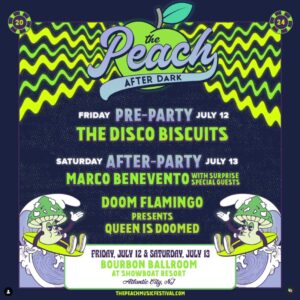
Peach at the Beach Adds Late Night Peach after Dark Sets
The Disco Biscuits to Perform a Pre-Party Set on Friday, July 12 Marco Benevento Band & Friends and Doom Flamingo Presents Queen is Doomed to
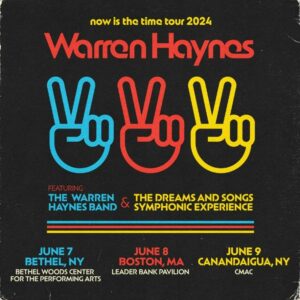
Warren Haynes Announces Now is the Time Tour
Now Is The Time Tour featuring The Warren Haynes Band & The Dreams and Songs Symphonic Experience for June 7th, 8th and 9th Pre-Sale Tickets
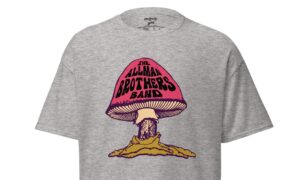
Allman Brothers Band Apparel at Section 119 Features Iconic Imagery
Introducing the Allman Brothers Band Fleece Collection—a celebration of timeless rock and roll style fused with the warmth and comfort perfect for any occasion. This
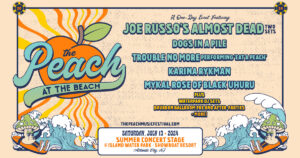
Peach at the Beach
JRAD TO HEADLINE ONE-DAY PEACH AT THE BEACH AT THE NEW SUMMER CONCERT STAGE AT ISLAND WATER PARK AT SHOWBOAT RESORT IN ATLANTIC CITY, NJ,
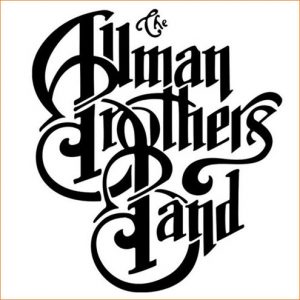
ALLMAN BROTHERS BAND name, ALLMAN BROTHERS name, likenesses, logos, mushroom design and peach truck are all registered trademarks of ABB MERCHANDISING CO., INC. whose rights are specifically reserved. Any artwork, visual, or audio representations used on this web site CONTAINING ANY REGISTERED TRADEMARKS are under license from ABB MERCHANDISING CO., INC. A REVOCABLE, GRATIS LICENSE IS GRANTED TO ALL REGISTERED PEACH CORP MEMBERS FOR THE DOWNLOADING OF ONE COPY FOR PERSONAL USE ONLY. ANY DISTRIBUTION OR REPRODUCTION OF THE TRADEMARKS CONTAINED HEREIN ARE PROHIBITED AND ARE SPECIFICALLY RESERVED BY ABB MERCHANDISING CO.,INC.
- Privacy Policy
- Terms of Service
- Report Infringement
site by Hittin’ The Web Group, LLC with www.experiencewasabi3d.com

IMAGES
VIDEO
COMMENTS
1969-1976, 1978-1982, 1989-present. Genre(s): Blues Rock
The Allman Brothers Band was a Southern rock band formed in 1969 by brother Duane and Greg Allman alongside Dickey Betts, Berry Oakley, Butch Trucks, and Jai Johanny "Jaimoe" Johanson.Their unique blend of blues, jazz, and country and jam-band improvisation was first captured on the live album "At Filmore East" (1971), which catapulted the band to international attention.
History. At the time of the tour, Cher had just finished production of The Sonny & Cher Show after a broken six-year run. Allman's band, The Allman Brothers Band, was in the middle of an acrimonious break up. The European leg of the tour covered the Netherlands, Belgium, France, UK and West Germany, over a period of 29 days. The tour started on November 6, 1977, and was to be a 29 date tour ...
The Allman Brothers Band was an American rock band formed in Jacksonville, Florida, in 1969 by brothers Duane Allman (founder, slide guitar and lead guitar) and Gregg Allman (vocals, keyboards, songwriting), as well as Dickey Betts (lead guitar, vocals, songwriting), Berry Oakley (bass), Butch Trucks (drums), and Jai Johanny "Jaimoe" Johanson (drums). ). Subsequently, based in Macon, Georgia ...
The Allman Brothers recorded live at Kentucky Fair and Expo Center in Louisville, Kentucky on April 30, 1976. https://www.amazon.com/Kentucky-Fair-1976-Allma...
Dreams Re-union Tour (1) Enlightened Rogues (74) Fall Tour 2010 (6) Hittin' The Note (1) Mycology Anthology (8) Reach for the Sky (70) Seven Turns (67) Shades of Two Worlds (6) Shape Shifter East Coast Tour 2012 (7) Summer 1999 Tour (1) The Roundup (5) United Palace Theatre Run 2010 (9) Win, Lose or Draw (1)
Allman Brothers Band Chronology. Beginnings. 70's. 80's. 90's. 2000's. 2010's. This chronology is a timeline of major personnel changes and album releases from the beginning to the final live performance in October 2014. While live shows are now history, we are combing the archives for material.
In the early 1960s, Gregg Allman got a guitar for Christmas and his brother Duane got a Harley 165 motorcycle. Eventually Duane traded the wrecked bike parts for a guitar and Gregg began to teach him. By 1961, the brothers were playing at teen dances around Daytona Beach, where they had lived since 1959. By 1963 they were in a band called The ...
In 1977-78, Gregg & Dickey do solo tours. ... and the Allman Brothers Band is the only group in history to have four different guitarists on Rolling Stone's 100 Greatest Guitarists of all time: Duane Allman, Dickey Betts, Warren Haynes and Derek Trucks. ... "My Cross To Bear," and Derek Trucks and Warren Haynes play in an all-star blues ...
The Allman Brothers are a southern rock band that formed in Florida, U.S. in 1969. Their music is a fusion of blues, jazz, country, R&B, and rock and roll. Their efforts have won them eleven gold and five platinum albums. Brothers Duane and Gregg Allman got their start in music in the early 1960's, performing as the duo the Allman Joys.
The Allman Brothers Band was an American rock band formed in Jacksonville, Florida, in 1969 by brothers Duane Allman (slide guitar and lead guitar) and Gregg Allman (vocals, keyboards, songwriting), as well as Dickey Betts (lead guitar, vocals, songwriting), Berry Oakley (bass guitar), Butch Trucks (drums), and Jai Johanny "Jaimoe" Johanson (drums). The band incorporated elements of Southern ...
Watch the full concert of The Allman Brothers Band, recorded live at the Capitol Theatre in 1979, and enjoy their classic songs and jam sessions. This video is a must-see for fans of southern rock ...
On September 3rd, 1977, the Grateful Dead returned to the stage at Englishtown, NJ's Raceway Park and was welcomed by over 125,000 fans. ... Originally billed as the Summer's End Concert but ...
Get the The Allman Brothers Band Setlist of the concert at Louisiana Superdome, New Orleans, LA, USA on August 31, 1975 and other The Allman Brothers Band Setlists for free on setlist.fm!
The Allman Brothers Band - Full ConcertRecorded Live: 9/23/1970 - Fillmore East (New York, NY)More The Allman Brothers Band at Music Vault: http://www.musicv...
In the summer of 1973, long before bumper stickers of the iconic skeleton-and-roses logo were a familiar sight on camper vans, the Dead teamed up with another legendary rock band, the Allman Brothers, to play a pair of concerts at RFK Stadium that were the first multi-day rock extravaganza in the District's history that drew 80,000 people to ...
The Allman Brothers Band. Special Guest: Muddy Waters. Monday September 15, 1975. New Haven Veterans Memorial Coliseum. Ticket Price: $8.00. Band Lineup: Gregg Allman, Richard Betts, Jaimoe, Chuck Leavell, Butch Trucks, Lamar Williams. Setlist*. Long Time Gone (Dickey Betts song) Midnight Rider.
Having made the album they wanted, the Allman Brothers embarked on a marathon tour to promote it. ... But none of them added up to a third of The Allman Brothers. Then suddenly, in 1977, the Allmans royalties dried up. But by the time they'd worked out how they'd been short-changed, Capricorn was broke too. ...
The Allman Brothers Band was an American rock band from Macon, Georgia.Formed in March 1969 by brothers Duane (guitar) and Gregg Allman (organ, vocals), the group originally also included guitarist and vocalist Dickey Betts, bassist Berry Oakley, and drummers Butch Trucks and Jai Johanny "Jaimoe" Johanson.The band went through multiple personnel changes and broke up twice before retiring in ...
Famous Musicians in Savannah 1975-present. Willie Nelson concert at the Savannah Civic Center. December 9, 1982 (Savananh Morning News) Greg Allman (at far right) and the Allman Brothers in their ...
The Allman Brothers Band Live at Fillmore East - New York, NY - September 23, 1970 - Full ConcertSetlist:1 - Don't Keep Me Wonderin' - 0:00:002 - Dreams - 0:...
Inspired by The Allman Brothers Band, the Grateful Dead & American Roots Music Roots Rock Revival is a four night, five day all-inclusive exploratory adventure. Read More » ... Now Is The Time Tour featuring The Warren Haynes Band & The Dreams and Songs Symphonic Experience for June 7th, 8th and 9th Pre-Sale Tickets. Read More »